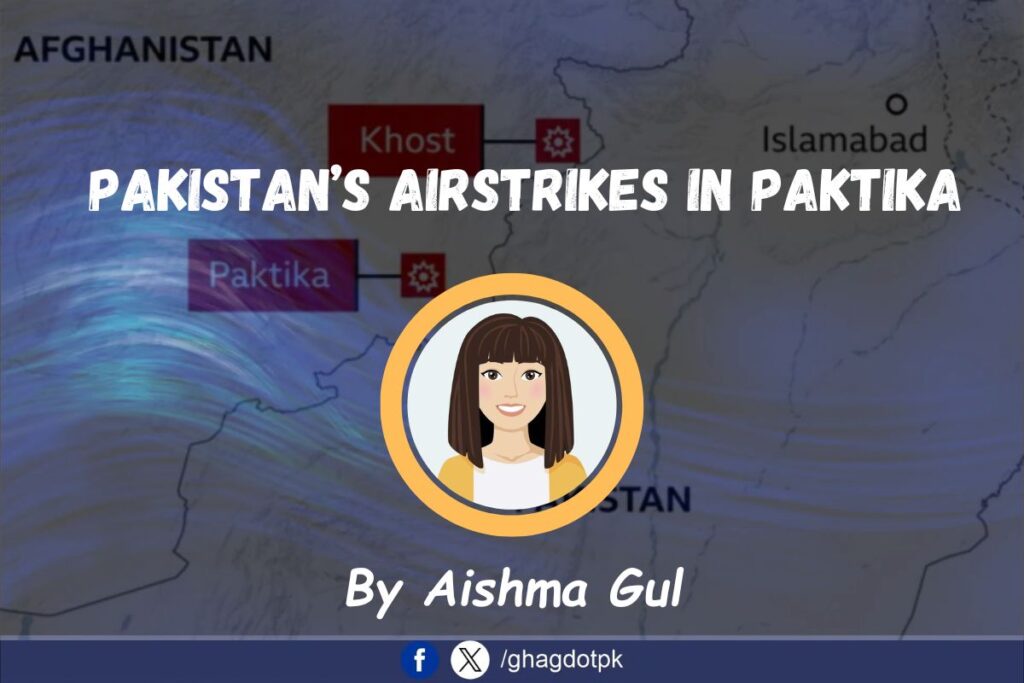By Aishma Gul
“Self-defense is not only a natural right but an imperative for the preservation of a nation’s sovereignty.”
Pakistan’s recent airstrikes in Afghanistan’s Paktika province show a major step in its fight against terrorism, focusing on the banned Tehreek-e-Taliban Pakistan (TTP). These attacks, which have gained global attention, were a response to the increasing threat of cross-border terrorism and came after a series of deadly incidents in Pakistan.
The Context: Rising Terrorism and Pakistan’s Response
According to the Pakistan Interior Ministry, the country has seen a significant rise in violence, with over 1,500 incidents reported in the first 10 months of 2024, resulting in at least 924 deaths. The breakdown of casualties includes at least 570 law enforcement personnel and 351 civilians.
The Pakistan Institute for Conflict and Security Studies (PICSS) has also reported a surge in terrorist attacks, with over 856 incidents recorded in 2024, surpassing the 645 incidents reported in 2023.
The rise in militancy has been linked to an estimated 6,000 TTP fighters in Afghanistan, who reportedly operate freely despite Pakistan’s repeated requests for cooperation from Afghanistan.
Last week, Tehreek-e-Taliban Pakistan (TTP) militants claimed responsibility for a deadly attack in South Waziristan that killed at least 16 Pakistani soldiers. This and other violent incidents highlighted the group’s growing strength, prompting Pakistan to intensify its counter-terrorism operations.
Similar strikes were conducted in March 2024, targeting terrorist hideouts in Afghanistan. However, the Afghan government has not acknowledged the presence of these terrorists on their soil.
The Paktika Airstrikes: A Decisive Move
On December 25th, Pakistan’s Air Force carried out precise airstrikes in Paktika, targeting TTP hideouts thought to be behind cross-border attacks. Reports indicate that at least 60 militants, including senior leaders Sher Zaman and Akhtar Muhammad, were killed. The strikes also destroyed “Umar Media,” the TTP’s propaganda network, disrupting its communication and recruitment efforts.
UN Charter Article 51: Right to Self-Defense
Article 51 of the UN Charter gives countries the right to defend themselves against attacks. This includes taking action like airstrikes to protect their people and territory. Under international law, countries have the inherent right to self-defence in response to armed attacks or imminent threats.
A Changing Counter-Terrorism Approach
Over the years, Pakistan’s strategy to combat terrorism has shifted significantly. From broad military operations like Operation Zarb-e-Azb to focused, intelligence-led operations under Azm-e-Istehkam, the emphasis is now on targeted strikes to reduce collateral damage. The Paktika airstrikes reflect this approach, with no civilian casualties reported despite their proximity to populated areas.
Risks of Retaliation and Broader Impacts
Although the strikes dealt a heavy blow to the TTP, they also risk triggering retaliation. The group has a history of regrouping and launching counterattacks, raising concerns about security in border areas. Furthermore, these operations may worsen Pakistan-Afghanistan relations, complicating regional stability efforts.
The threat posed by the TTP extends beyond Pakistan. A stronger TTP endangers global and regional security, potentially destabilizing South Asia. International players, including the United States and China, have urged Pakistan and Afghanistan to work together to address this issue.
Economic and Humanitarian Challenges
The economic impact of terrorism in Pakistan is severe. Ongoing militancy disrupts trade, discourages investment, and hinders development, particularly in western regions. The China-Pakistan Economic Corridor (CPEC), a vital part of Pakistan’s economic strategy, faces delays due to security concerns.
On a humanitarian level, continued violence worsens poverty and displacement, making it harder to support vulnerable communities. Addressing these challenges is crucial for achieving lasting peace and stability.
Since 2021, Pakistan’s western border has seen a rise in militant attacks after the Taliban took power in Afghanistan. But Pakistan’s military has taken strong action, like the recent operation in Paktika, to protect the country’s sovereignty.
This shows Pakistan’s firm commitment to fighting security threats. While military action is crucial, Pakistan knows that lasting peace needs more. It requires working with neighbouring countries, building a strong economy, and addressing the root causes of extremism. The situation is tough, but Pakistan is determined to overcome this challenge and keep the country safe.






